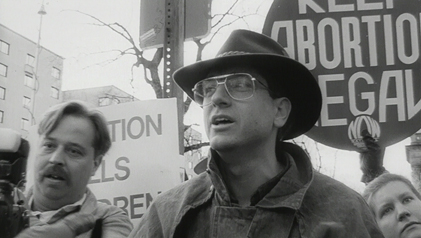|
Reviews of Recent Independent, Foreign, & Documentary Films in Theaters and DVD/Home Video
Director of Photographer, Written, Produced & Directed by Tony Kaye. Edited by Peter Goddard. Music by Anne Dudley. Released by ThinkFilm. Country of Origin: USA. 152 min. Not Rated. Abortion is one of the hottest political issues in our culture, with both sides very emotional and very committed to their convictions. Into this controversial subject steps British director Tony Kaye (American History X) with his brutal black-and-white documentary, tracing the issue over the last 15 years. The film starts at the beginning of the Clinton administration with the annual March for Life in Washington DC, but it really begins when he takes us to the clinics, the frontline of the war. Kaye definitely wants to push the envelope, showing an abortion of a 20-week fetus, and he interviews lots of thinkers on the topic, including Noam Chomsky, Alan M. Dershowitz, and Nat Hentoff, but the film is very lacking on female experts, and for an issue that is about women, this is a big problem. He does interview Francis Kissling, who, until this year, was the head of Catholics for a Free Choice and whose knowledge of the church’s role on abortion is vast, and Kate Michelman, the former head of National Abortion Rights Action League (whose name the film spells incorrectly). Memory is short and fleeting even for people who care about this issue (disclaimer: I participated in protests and rallies in the late ‘80s and early ‘90s), so this film is an important reminder of a series of horrible events, the murders of abortion providers. Kaye interviews many of anti-abortion activists (almost all men) who were on the forefront when the murders occurred. Most of the men, at first, come off as normal, but you quickly realize (through their own words and actions) that they are extreme zealots. They commonly talk about wanting to create a jihad and how most of the rabid “feminazis” are lesbians. Paul Hill, who murdered Dr. John Bayard Britton and was executed for that crime, called Michael Griffin, the murderer of abortion provider Dr. David Gunn, a “hero” and declared that “all abortionists should be executed.” Kaye also shows how the anti’s got organized in the late 1980s, from volunteers to full-paid leaders of the growing non-profit organizations that bought houses around clinics to lure women away and to get them to change their minds about having an abortion. His 15-year devotion to the topic is commendable, but it is not until the last third of a too-long movie that the film brings women into focus with Jane Roe, Norma McCorvey. She has always been a woman of controversy and initially took pride in her role as Jane Roe, but of late she has become the poster woman for the anti-abortion movement and is working to get Roe v. Wade overturned. Kaye also takes us on the journey of a woman who has made the decision to have an abortion (even filming it), with all the surrounding emotional issues. It’s a behind-the-scenes close-up into this issue that you seldom see. Some of the most moving moments of the film are from Emily Lyons, the nurse who was maimed by a 1998 clinic bombing in Birmingham, Alabama. She relays what many women who are passionate about the issue believe: this is “not just about abortion, it’s about choice.” I just wish the film had more of the women’s passion in it. Melissa Silverstein, a writer on women & popular culture and online editor for The Women's Media Center
|

